Afghanistan
More than four years ago, the U.K. Ministry of Defence bought 6 Reaper drones from the U.S. The Guardian reports.
"The British military is increasingly relying on unmanned drones to wage war against the Taliban, and has fired more than 280 laser-guided Hellfire missiles and bombs at suspected insurgents, new figures reveal. … The Ministry of Defence says only four Afghan civilians have been killed in its drone strikes since 2008. However, it also says it has no idea how many insurgents have died, because of the "immense difficulty and risks" of verifying who has been hit."
Chris Cole, founder of the website Drone Wars UK, responds that it is:
“Kafkaesque of the MoD to repeatedly claim that only four civilians have been killed in UK drone strikes while at the very same time insisting they do not know how many people have been killed."
Carlo Munoz reports for The Hill:
"American negotiators working with Pakistan to reopen critical supply routes into Afghanistan have been called back to the United States, casting further doubt on whether the lines will ever be reopened to U.S. and coalition forces. Defense Department spokesman George Little told reporters on Monday that several members of the U.S. negotiation team had already left Islamabad, with the remaining members scheduled to depart the country within days."
Read the full story here

Last month, White House counter-terrorism adviser John Brennan acknowledged in a public speech at the Woodrow Wilson Center that the United States was using armed unmanned drones to kill alleged militants.
Brennan’s acknowledgement was the only “new” news.
Beginning in earnest under President George W. Bush and dramatically escalating under President Barack Obama, the United States is now using drones in four countries (Afghanistan, Pakistan, Yemen, and Somalia), and has used them in two others (Iraq and Libya). Going by the names Reaper and Predator, firing missiles named Hellfire, the drones are responsible for thousands of deaths, including hundreds of women and children.
Why drones?
There are three major reasons opponents of the unmanned death planes usually give. First, in fighting against terrorist and insurgent organizations, the United States has adopted a kill — not capture — strategy. With a “kill list” of targets, the attacks aim at known or suspected leaders.
Second, the attacks can be carried out with no danger to American troops. Remotely guided from distant locations, drones are a way of carrying out risk-free military operations. Third, with the attacks increasingly under the control of the CIA rather than the military, they can be conducted with a high degree of secrecy. Whom the drones targeted and killed, and how many civilians may have also been killed, is free of scrutiny.
 Earlier this month, I boarded a train with my brother-in-law and headed to Chicago to protest the 2012 NATO Summit. If you are asking "why protest?" you can find a substantial list here.
Earlier this month, I boarded a train with my brother-in-law and headed to Chicago to protest the 2012 NATO Summit. If you are asking "why protest?" you can find a substantial list here.
Security had been ramped up and no food or liquids were allowed on the train. We met some fellow protesters during the trip and when we arrived at Union Station we hustled to make it to Grant Park on time. In transit to the park the sun was already warming our necks and I found myself reaching for the small tube of sunblock that I had stashed in my pocket.
We arrived in plenty of time to catch the pre-march rally at Petrillo Bandshell. Many stories were shared by fellow activists from around the world. The air was humid, yet vibrating with the passion of thousands as we prepared to march together for peace.
Amidst a swirl of percussion the crowd was chanting: "We are unstoppable! Another world is possible!"

This coming fiscal year, the United States is set to spend more than $640 billion dollars on the Pentagon and war, accounting for more than 60 percent of federal domestic spending. In excess of $85 billion of that will be spent on the war in Afghanistan alone.
This unfathomable amount of money was approved by the House of Representatives in the National Defense Authorization Act. These funds will serve to bring suffering and pain to innocent people, further militarize the world and undermine peace and stability for generations to come—all on the backs of those who struggle at home.
In the backdrop of such spending, we’re told that we’re in a financial crisis. Elected officials tell us it is time to make tough choices. There isn’t enough money for programs like “Meals on Wheels” and for ensuring everyone has access to adequate healthcare. Our schools and bridges must wait to be repaired. New roads and schools must remain unconstructed.
Yet some of us know better.
 CLICK HERE TO HELP PROTECT POVERTY PROGRAMS FROM FEDERAL BUDGET CUTS (and get an "End Poverty" or "Wage Peace" bumper sticker.)
CLICK HERE TO HELP PROTECT POVERTY PROGRAMS FROM FEDERAL BUDGET CUTS (and get an "End Poverty" or "Wage Peace" bumper sticker.)
The House of Representatives has been debating the defense authorization bill for the past two days, including more than 140 amendments. But this year’s version of the McGovern-Jones amendment calling for a faster withdrawal of U.S. troops from Afghanistan was not among them. Reps. Jim McGovern (D-MA) and Walter Jones (R-NC) have offered similar amendments for several years, steadily gaining votes. Last year, there 204 votes in favor, including 26 Republicans. Activists believed this year might see an even higher total, perhaps enough to pass. Rather than face that result, the Rules Committee simply ensured that it would not come to the floor for a vote.
CNN reported this morning two GOP congressional sources confirming that Republicans were concerned the amendment could pass. The only Afghanistan withdrawal amendment made in order was by Barbara Lee (D-CA), which would have essentially ended the war by limiting funding to the safe and orderly withdrawal of U.S. troops and military contractors from Afghanistan. It predictably failed on a 303-113 vote.
Both McGovern and Jones denounced the action. McGovern asking, "What is the Republican leadership afraid of? Are they afraid a bipartisan majority of this House will vote to follow the will of the American people and change our Afghanistan policy?" Jones added, "This is supposed to be the people's House - that means we listen to the people. How about listening to the 72% of those who say get out of Afghanistan?” The next opportunity will likely be the defense appropriations bill sometime this summer.
In his successful run for president of France, one of Francois Hollande’s campaign promises was to withdraw all French troops from Afghanistan by the end of this year. Now that he’s taken office, he’s discovering that was easier to promise than it will be to accomplish.
Military specialists are advising him that it is “next to impossible to transport all combat troops and their equipment back to France by the end of the year.” A number of other countries, faced with opposition at home to their war involvement, are also interested in speeding up withdrawals. It should make for interesting discussions at this weekends' NATO Summit.
Gen. John Allen, the U.S./NATO commander in Afghanistan, is reorienting the military mission in Afghanistan. As U.S. troops leave, Afghan troops must take the lead.
Faced with an order from President Obama to withdraw 23,000 troops by the end of the summer, and the prospect of further reductions next year, Allen is hastily transforming the U.S. military mission in Afghanistan. Instead of trying to continue large U.S. counterinsurgency operations for as long as he can, he is accelerating a handover of responsibility to Afghan security forces. He plans to order American and NATO troops to push Afghans into the lead across much of the country this summer, even in insurgent-ridden places that had not been candidates for an early transfer.
From The Associated Press' Anne Gearan:
"Support for the war in Afghanistan has reached a new low, with only 27 percent of Americans saying they back the effort and about half of those who oppose the war saying the continued presence of American troops in Afghanistan is doing more harm than good, according to an AP-GfK poll.
In results released Wednesday, 66 percent opposed the war, with 40 percent saying they were "strongly" opposed. A year ago, 37 percent favored the war, and in the spring of 2010, support was at 46 percent. Eight percent strongly supported the war in the new poll."
How many more times do we have to read a story like this one?
The American military claimed responsibility and expressed regret for an airstrike that mistakenly killed six members of a family in southwestern Afghanistan, Afghan and American military officials confirmed Monday. The attack, which took place Friday night, was first revealed by the governor of Helmand Province, Muhammad Gulab Mangal, on Monday.
If it is the U.S. intention to win over the Afghan people, this is exactly how not to do it.
As reported by Cathy Lynn Grossman for USA Today:
The annual National Day of Prayer, mandated by Congress in 1952, is upon us and the usual folks are out with proclamations, prayers -- and protests. President Obama issued his annual proclamation on Monday, making special mention of prayers for the military as befitted his surprise visit to Afghanistan.
Read the full article here
From Joe Scarborough's Politico blog last night:
The takeaway of President Obama's speech tonight is simple. The neocons won, the troops lost and the endless war grinds on in a land that humbled the Soviet Union, the British Empire and Alexander the Great. Good luck with that, Mr. President.
Read the full post here
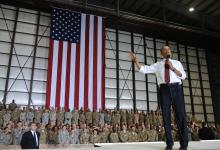
Watch videos of President Obama's surprise visit to Afghanistan today and read the transcript of his address to the American people tonite inside the blog.
"As we move forward, some people will ask why we need a firm timeline. The answer is clear: our goal is not to build a country in America's image, or to eradicate every vestige of the Taliban. These objectives would require many more years, many more dollars, and many more American lives. Our goal is to destroy al Qaeda, and we are on a path to do exactly that. Afghans want to fully assert their sovereignty and build a lasting peace. That requires a clear timeline to wind down the war. Others will ask why we don't leave immediately. That answer is also clear: we must give Afghanistan the opportunity to stabilize. Otherwise, our gains could be lost, and al Qaeda could establish itself once more. And as Commander-in-Chief, I refuse to let that happen.
"I recognize that many Americans are tired of war. As President, nothing is more wrenching than signing a letter to a family of the fallen, or looking in the eyes of a child who will grow up without a mother or father. I will not keep Americans in harm's way a single day longer than is absolutely required for our national security. But we must finish the job we started in Afghanistan, and end this war responsibly."
~ President Obama speaking to the nation from Bagram Air Base in Afghanistan
Presidents Obama and Karzai have signed in Kabul a strategic partnership agreement between the two countries.
The Associated Press reports:
“The partnership spells out the U.S. relationship with Afghanistan beyond 2014, covering security, economics and governance. The deal is limited in scope and essentially gives both sides political cover: Afghanistan is guaranteed its sovereignty and promised it won't be abandoned, while the U.S. gets to end its combat mission in the long and unpopular war but keep a foothold in the country. The deal does not commit the United States to any specific troop presence or spending. But it does allow the U.S. to potentially keep troops in Afghanistan after the war ends…”
“At a signing ceremony in Kabul with Afghan President Karzai, Obama said the agreement paves the way for 'a future of peace’ while allowing the United States to ‘wind down this war.’ Karzai said his countrymen ‘will never forget’ the help of U.S. forces over the past decade.”
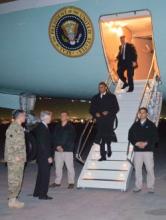
President Barack Obama landed in Afghanistan this afternoon on an unannounced trip. He will meet with Afghan President Hamid Karzai and sign a strategic partnership agreement pledging U.S. support for Afghanistan for a decade after 2014 when the U.S. combat role is set to end.
Obama will then deliver a live, televised speech to the American people on live television at 7:30 this evening (Tuesday). He is expected to give an update on Afghan withdrawal plans.
Update—5 p.m.
Presidents Obama and Karzai have signed in Kabul a strategic partnership agreement between the two countries.
The Associated Press reports:
“The partnership spells out the U.S. relationship with Afghanistan beyond 2014, covering security, economics and governance. The deal is limited in scope and essentially gives both sides political cover: Afghanistan is guaranteed its sovereignty and promised it won't be abandoned, while the U.S. gets to end its combat mission in the long and unpopular war but keep a foothold in the country. The deal does not commit the United States to any specific troop presence or spending. But it does allow the U.S. to potentially keep troops in Afghanistan after the war ends…”
“At a signing ceremony in Kabul with Afghan President Karzai, Obama said the agreement paves the way for 'a future of peace’ while allowing the United States to ‘wind down this war.’ Karzai said his countrymen ‘will never forget’ the help of U.S. forces over the past decade.”
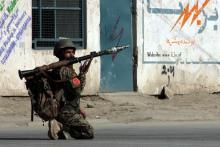
On November 21, 1967, General William Westmoreland, U.S. commander in Vietnam, delivered a speech at the National Press Club on war strategy. “We have reached an important point when the end begins to come into view,” he said, and outlined a “new phase” in the war where the U.S. would:
- Help the Vietnamese Armed Forces to continue improving their effectiveness.
- Help the new Vietnamese government to respond to popular aspirations and to reduce and eliminate corruption.
- Help the Vietnamese strengthen their policy forces to enhance law and order.
Then came what is now known as the Tet Offensive. On January 30, 1968, the National Liberation Front launched attacks against cities and towns throughout South Vietnam. It was the beginning of the end, the evidence that U.S. strategy had failed.
Fast forward 45 years. U.S. strategy in Afghanistan emphasizes assisting the Afghan army and police forces to improve their effectiveness along with working to reduce corruption in the government. We hear encouraging speeches from politicians and generals. We’re told the end is in sight.

As is increasingly evidenced by developments in Afghanistan from gloomy intelligence reports to the Quran burning to the recent massacre of 16 Afghan civilians, including nine children, it is long past time for the U.S. military to leave that country.
After weeks of tumultuous upheaval, the slaying allegedly by a U.S. Army Staff Sergeant is just the most recent incident undermining U.S. objectives to win hearts and minds. Frankly, that mission has long been lost.
We are still learning about the Staff Sergeant, a married father of two. It appears he was deployed to both Iraq and Afghanistan a total of four times. On one of those tours, he suffered a traumatic brain injury (TBI), but was declared “fit for duty” by the U.S. Army. Afghans would certainly beg to differ. This is also more evidence that the U.S. military cannot be allowed to deploy troops with diagnosed psychological issues—such as Post Traumatic Stress or TBIs, a messaged pushed by a project called Operation Recovery.
If you were walking down the street and a stranger approached you and punched you in the face what would you want to do in that moment? Sure, this is an odd hypothetical situation, but really, answer the question.
Few would say, “I would want to give that person a hug.” Depending on the size of the attacker most would either fight back or run away. But let’s suppose you fought back, and even vanquished your assailant, pummeling him repeatedly for his dastardly deeds. What then?
Would he, through being beaten, come to understand his wrong in hitting you? No, he might start plotting his revenge, or his friends would think about getting you back for what you did. If they did, then you would have friends that would want to get them back. So it goes with the endless spiral of violence.
We have been fooled into believing that violence is a respectable solution for problems in our world. What we fail to see is the many problems that violence brings with it, beginning with more violence. Violence also brings hurt, fear, anger, a desire for revenge, death and enmity.
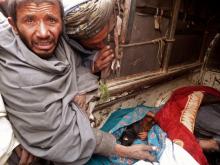
Another 16 lives were added to the body count of the war in Afghanistan over the weekend.
All of them civilians, nine were children, including one three year old girl.
The alleged perpetrator, a U.S. Sergeant, killed many of the victims with a single shot to the head before he piled together eleven of the bodies and set them on fire.
There is no way to measure the loss for the families of the victims, no way to understand the harm done to peace process in the country and no way to calculate the additional deaths of Americans, Afghans and others from across the world this will likely cause.
There is no way to know the full cost of war.
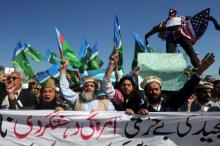
The Taliban is attempting to capitalize on the outbreak of violence that followed the inadvertent burning of a Quran by NATO troops by characterizing the war as a conflict between infidels and Islam, analysts said.
"It's tailor-made to their argument that the United States is trying to desecrate and destroy Islam," said Seth Jones, an analyst at Rand Corp. and author of In the Graveyard of Empires: America's War in Afghanistan. "It's patently untrue."
On Monday, a suicide car bomber launched an attack against the gates of a coalition base in Jalalabad, killing nine Afghans. The Taliban said the attack was revenge for the Quran burning, The Associated Press reported.
Over the weekend, two military advisers were found dead in their office at the Interior Ministry, a highly secure facility in Kabul. In response, NATO withdrew all its advisers from government ministries as Afghan police searched for a suspect in the killings.
The Quran burning threatens to undermine cooperation between Afghan and coalition forces, which is at the heart of the U.S. strategy to withdraw its troops and turn over security to Afghan forces, analysts said.